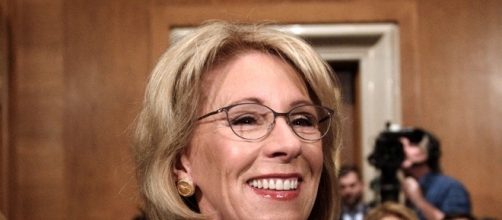In an interesting move on Tuesday, Education Secretary Betsy DeVos "rolled back" Obama administration policies that protected students receiving government loans. An NBC News report indicates that under Obama's plan, loan companies were given incentives to work with students in collecting debts. These incentives were quite lucrative, and helped keep many students' heads above water as they struggled to find jobs or other reliable means of income straight out of college.
Devos decided to roll back Obama memos to 'save taxpayers money'
Reports indicate that Devos' decision to withdraw the Obama memos was her attempt to defray some of the taxpayer cost associated with default loans.
She also claimed "accountability" and "customer service" on both ends of the spectrum -- the borrower and the lender would see dramatic improvements without having Obama's incentives to lean on. In her official "withdrawal memo," the 59-year-old indicated "a lack of consistent objectives" as another reason she decided to pull the plug on the Obama-initiated policies. Sources claim Devos' decision was misguided and will lead to more complications for both current borrowers and those attempting to pay their loans back.
Experts claim removing Obama memos will make it that much harder for students to secure loans
In explaining the importance of the former Obama memos and the new difficulties prospective borrowers will now face, Adam Minsky, an attorney who specializes in student loan services, claimed borrowers are now going to have to work decidedly harder to come up with new ways to pay their loans back, and more research may be involved in choosing the right loan provider to begin a contract with.
Also, with companies no longer receiving money to extend a helping hand, many providers may be a lot less lenient with those who can't make their payments. In an interview with Heather Jarvis, founder of a company that offers consultation on managing student loans, NBC News uncovered an unsettling conundrum about the reality of student loans: "Borrowers don't get to decide who their servicers are and (the servicers) can make your life miserable," Jarvis explained.
College financing is now purely in the hands of private lenders
In the Obama era, things remained relatively fair for all parties, as even though students couldn't control who they were borrowing money from, they could rely on the government incentives to make sure private lenders worked with them.
Now, that assurance is gone, and the typical student (who faces an average of $30K in debt after graduating) is essentially stuck on an island with no power at all.
Instead of potential undergraduates wondering how they'll manage to pay off their loans post-graduation, the new question could very well be if college is worth the debt at all.

